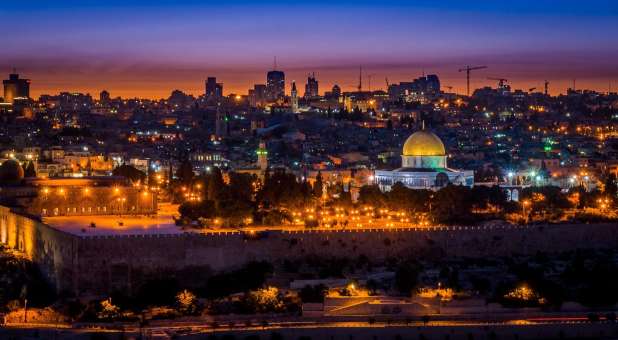An Israeli diplomat indicated this week that the Jewish state and Turkey are continuing to make a concerted effort to rebuild the strained relationship that has existed between the former allies under Turkish President Recep Tayip Erdogan, despite the doubts that were cast on the stop-and-go reconciliation process by Turkish Prime Minister Ahmet Davutoğlu’s recent resignation announcement.
Policy experts, meanwhile, say that the misperception of Davutoğlu’s “moderate” tack means his resignation wasn’t a game-changer for the normalization talks to begin with.
Israel’s consul general in Istanbul, Shai Cohen, affirmed that normalization talks between Israel and Turkey have seen “advanced momentum.”
“We hope the reconciliation process won’t be affected by the political shift in Turkey,” Cohen said, Reuters reported.
The two countries have been mired in a longstanding feud that originated with the 2010 Gaza flotilla incident, in which nine Turks were killed in clashes after Turkish militants attacked Israeli commandos who had boarded a ship that was trying to breach the blockade on Gaza. But more recently, the Turkish government’s offering of condolences to Israel in the aftermath of the March 2016 suicide bombing in Istanbul, in which three Israeli tourists were killed, was viewed as signaling a shift in Turkey’s outlook on the Jewish state. Additionally, Erdogan’s AKP political party expelled a low-level official, Irem Aktas, for tweeting that she “wished that the wounded Israeli tourists were dead.”
Yet after the announcement of the impending May 22 resignation of Davutoğlu—who the West views as a more moderate leader than Erdogan—questions arose about the future of the Turkish-Israeli reconciliation effort. Davutoğlu reportedly resigned because he opposes the presidential system that Erdogan wants to implement in order to consolidate his power in lieu of the current Turkish parliamentary system, among other reasons. Israel’s Cohen confirmed that the resumption of negotiations on normalization “will have to wait until the composition of the new Turkish government on May 22.”
Dr. Aykan Erdemir, a member of the Turkish Parliament from 2011-2015 and a senior fellow at the Foundation for Defense of Democracies (FDD) think tank, told JNS.org that the perception of Davutoğlu as a moderate is a misconception. In January 2015, Davutoğlu accused Israeli Prime Minister Benjamin Netanyahu of committing “crimes against humanity,” echoing Erdogan’s anti-Israel rhetoric at the time. In April 2016, Davutoğlu indicated that Turkey wouldn’t normalize relations with Israel until the Jewish state lifts the maritime blockade of Gaza.
For a number of years under Erdogan, Turkey had sought to improve relations with its neighboring Muslim countries and cement itself as a regional leader. In the process, Erdogan’s government became increasingly Islamist, lending its support to the radical Muslim Brotherhood and its offshoot movements across the Middle East (including the Palestinian terror group Hamas). Erdogan also ramped up his anti-Israel and anti-Semitic rhetoric, including a comments that “Jewish capital” is behind the New York Times.
Turkey had also been courting Russia. In 2013, Erdogan indicated that Turkey would be willing to abandon its desire to join the European Union in exchange for membership in the Shanghai Cooperation Organization, in which Russia is a member along with China, Kazakhstan, Kyrgyzstan, Tajikistan, and Uzbekistan. But Turkish ties with Russia soured after Turkey downed a Russian jet near the Syria-Turkey border in November 2015.
“Turkey’s regional foreign policy has collapsed on the back of its Syria policy, and it is fighting a war with Kurdish insurgents in its own southeast along with fighting ISIS (Islamic State) in Syria and dealing with terror attacks at home from both groups,” Michael Koplow, an expert on Turkey and the policy director for the Israel Policy Forum think tank, told JNS.org.
“Israel can be an asset when it comes to Syria given its intelligence resources, and the Turkish government also believes that better relations with the U.S. will result should it reconcile with Israel,” said Koplow. “Turkey and Israel have also been bandied about as potential energy partners, with Israel needing a market where it can export its natural gas, and Turkey needing a supplier to meet its growing energy needs and help it reduce its reliance on Russian gas. For all of these reasons, Turkey has concluded that it will be better to improve relations with Israel than to continue the status quo.”
Koplow also believes that while Davutoğlu was more moderate than Erdoğan on some issues, Israel wasn’t one of these issues.
“Davutoğlu was actually in many ways the primary driver of antagonism toward Israel at the highest levels of the Turkish government, and I do not think it is a coincidence that the real downturn in relations coincided with his elevation to the Foreign Ministry,” he said.
While “nobody in Israel will be shedding any tears for Davutoğlu now that he is gone,” his resignation “does not make reconciliation automatic,” Koplow explained.
One of those divisive issues is the Israeli-Palestinian conflict and the role of Hamas, which rules Gaza. Besides Turkey’s demand that Israel lift the Gaza blockade, Hamas maintains its international headquarters in Istanbul. Erdogan met with Hamas leader Khaled Mashaal in Istanbul last December and has shown no indication that the terror group will be ousted from Turkey.
Efraim Inbar, a professor of political studies at Israel’s Bar-Ilan University and director of the Begin-Sadat Center for Strategic Studies, told JNS.org that despite Turkey’s positive gestures toward Israel after the Istanbul suicide attack, Erdogan’s regime “still remains.” Maintaining the Gaza blockade “is a clear national security issue for Israel,” said Inbar, who also noted Turkey’s refusal “to sever its links with Hamas.”
“Therefore, I see certain improvement in the atmosphere but nothing on concrete issues,” he said. “We should not live under an illusion that Turkey and Erdogan will become a friend of Israel.”
One factor that could be a game-changer, however, is natural gas. Fifty-five percent of the gas used in Turkey is currently supplied from Russia, and another 15 percent comes from Iran. Amid its rift with Russia, Turkey is seeking to obtain gas from the alternative source of Israel’s offshore Leviathan field. According to the Israeli business news outlet Globes, Israel is very close to signing a gas-export agreement through which Turkey will consume half of the Leviathan’s gas reserves starting in 2020.
Globes also reported that if Turkish Minister of Energy and Natural Resources Berat Albayrak (Erdogan’s son-in-law) replaces Davutoğlu as prime minister, it would “help move the gas-export deal forward.”
“Erdogan wants to sign a deal with Israel, and the appointment of the minister of energy will prove that he is attaching great importance to enhancing Turkey’s energy security,” said a source close to the Israel-Turkey negotiations.
FDD’s Erdemir said that Erdogan “is now doing the right thing, that is Turkish-Israeli cooperation, but for the wrong reasons.”
“His core values are still strongly anti-Semitic,” said Erdemir. “If he had more leverage, more power in international relations, I don’t think he would not be too interested in reconciliation [with Israel].”
Erdemir also raised the possibility that while Erdogan seeks to centralize and increase his executive power, the Turkish president would be willing “to do anything” to accomplish that goal—including to “destroy the [reconciliation] process” with Israel. {eoa}
For the original article, visit jns.org.
See an error in this article?
To contact us or to submit an article























